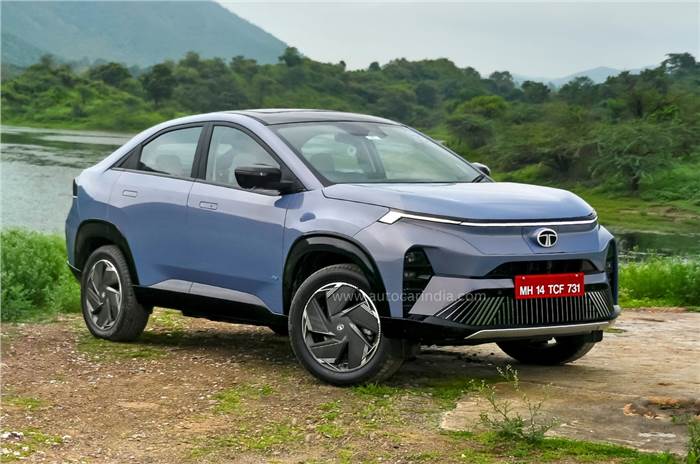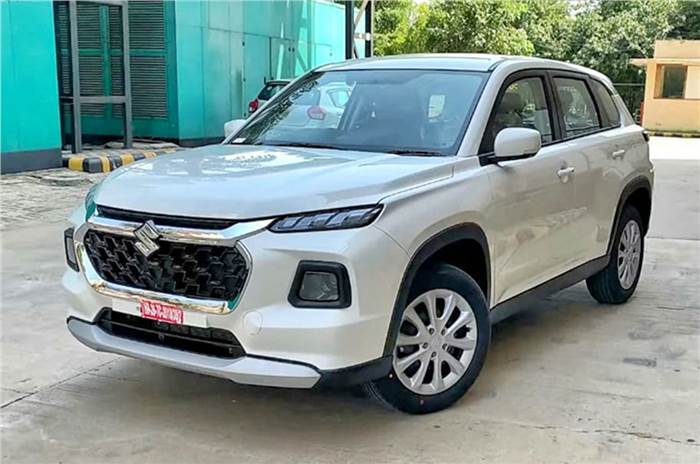Toyota currently sells four badge-engineered ICE Maruti models in India.
Published On Dec 13, 2024 07:42:00 PM
The Toyota Urban Cruiser EV was recently revealed globally, and we pit it against its sister model, the Maruti Suzuki e Vitara. These ground-up electric SUVs look very similar to their concepts and will rival the MG ZS EV, Tata Curvv EV, the upcoming Hyundai Creta EV and the Mahindra BE 6e upon launch.
- e Vitara is Suzuki’s global model; 50 percent production to be exported
- Will be produced at the brand’s Gujarat plant
- Production-spec Urban Cruiser EV is 15mm shorter than the concept
Maruti e Vitara vs Toyota Urban Cruiser EV: dimensions
While both SUVs have the same 2,700mm wheelbase, the Toyota EV is 10mm longer and 5mm taller. Notably, their wheelbase is significantly longer than MG’s 2,585mm and Tata’s 2,560mm.
| Maruti e Vitara vs Toyota Urban Cruiser EV: dimensions | ||
|---|---|---|
| Dimensions | Maruti and Vitara | Toyota Urban Cruiser EV |
| Length (mm) | 4,275 | 4,285 |
| Width (mm) | 1,800 | 1,800 |
| Height (mm) | 1,635 | 1,640 |
| Wheelbase (mm) | 2,700 | 2,700 |
| Ground Clearance (mm) | 180 | 180 (unofficial) |
| Wheel size (inch) | 18 or 19 | 18 or 19 |
Maruti dubs its skateboard platform Heartect-e, and claims it blends “the advanced feel of a BEV and the robust nature of an SUV”. This base is also capable of housing “e-axles”, which combine the motor and inverter.
Maruti e Vitara vs Toyota Urban Cruiser EV front
We expect the born-electric Japanese offerings to be decently spacious. Toyota has not disclosed the ground clearance, but it is likely to be the same as the e Vitara’s 180mm.
Maruti e Vitara vs Toyota Urban Cruiser EV: battery, motor, range
| Maruti e Vitara vs Toyota Urban Cruiser EV: battery, motor, range | ||
|---|---|---|
| Specifications | Maruti and Vitara | Toyota Urban Cruiser EV |
| Battery capacity (kWh) | 49/61 | 49/61 |
| Drive system | FWD/AWD | FWD/AWD |
| Motor Output (hp) (FWD/FWD/AWD) | 144/174/184 | 144/174/184 |
| Maximum Torque (Nm) (FWD/AWD) | 189/300 | 189/300 |
| Range (km) | 500km+ | 500km+ (unofficial) |
Maruti’s over 500km range on a single charge on the MIDC cycle, which is more than MG and Tata. Front-wheel configuration gets varying power outputs – 144 and 174hp – that could be spread strategically across variants.
Maruti e Vitara vs Toyota Urban Cruiser EV: interior, features
Like on the outside, even the interiors are similar to the concept. At first sight, the steering with its flat top and bottom catch your eye. Then, the instrument cluster and infotainment system, which measure 10.25 inches and 10.1 inches, respectively, also look the same. Android Auto and Apple CarPlay will be on offer, besides wireless phone charging. Interestingly, the rectangular AC vent design in the horizontally stacked dashboard reminds one of the Kia Sonet.
Maruti e Vitara vs Toyota Urban Cruiser EV interior
Their on-board ADAS suite will get features like Adaptive Cruise Control and Lane Keep Assist. Toyota revealed that the Urban Cruiser’s rear seats can be slid and reclined 40:20:40, and get a 40:20:40 split-folding function. There are large door pockets and physical HVAC controls, but it’s the brown-black interior that sets the Maruti apart (single-tone in the Toyota).
Maruti e Vitara vs Toyota Urban Cruiser EV: exterior design
Both the e Vitara and Urban Cruiser EV share a host of exterior design elements. They still have the concept-derived two-box SUV design. Additionally, both vehicles share rear door handles located on the C-pillar, a design element we first saw on the third-generation Swift. Both offer up to 19-inch wheels.
Despite their similarities, there are distinct styling cues reflecting their brand identities and design. The e Vitara, for instance, boasts tri-slash LED Daytime Running Lamps front and back, resembling the eVX concept. Extensive dark cladding around the vehicle contributes to a muscular and sturdy appearance.
Maruti e Vitara vs Toyota Urban Cruiser EV rear
In contrast, the Urban Cruiser EV’s design is more subdued; the nose and headlights are thinner and less pronounced than the concept, and the bumper is less angular. We spotted a blue dot and ‘BEV’ lettering – denoting it is a battery electric vehicle – pasted on the charging cover and the right fender. This is similar to the recently launched Camry hybrid sedan – a blue dot and ‘HEV’.
At the rear, Toyota’s design appears different due to toned-down tail-lights. Furthermore, Toyota has promised to offer 12 colour options, one more than the Vitara.
Also see:















.jpg&c=0&w=700)







































.jpg&w=735&h=415&q=85)
.jpg&w=735&h=415&q=85)
.jpg&w=735&h=415&q=85)
.jpg&w=735&h=415&q=85)
.jpg&w=735&h=415&q=85)
.jpg&w=735&h=415&q=85)



